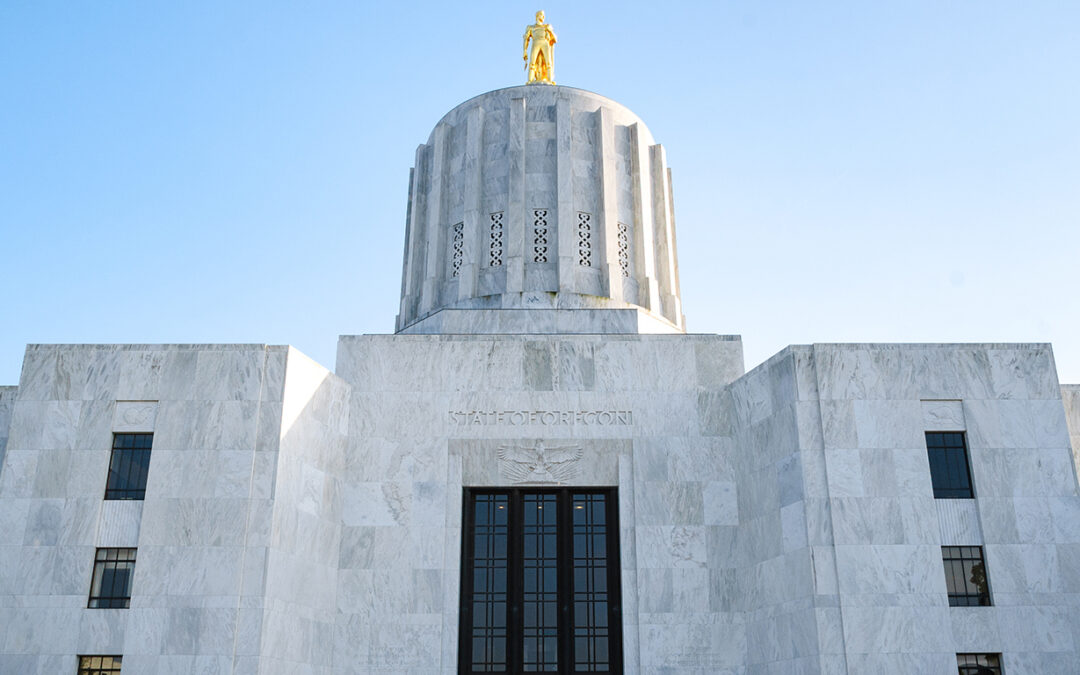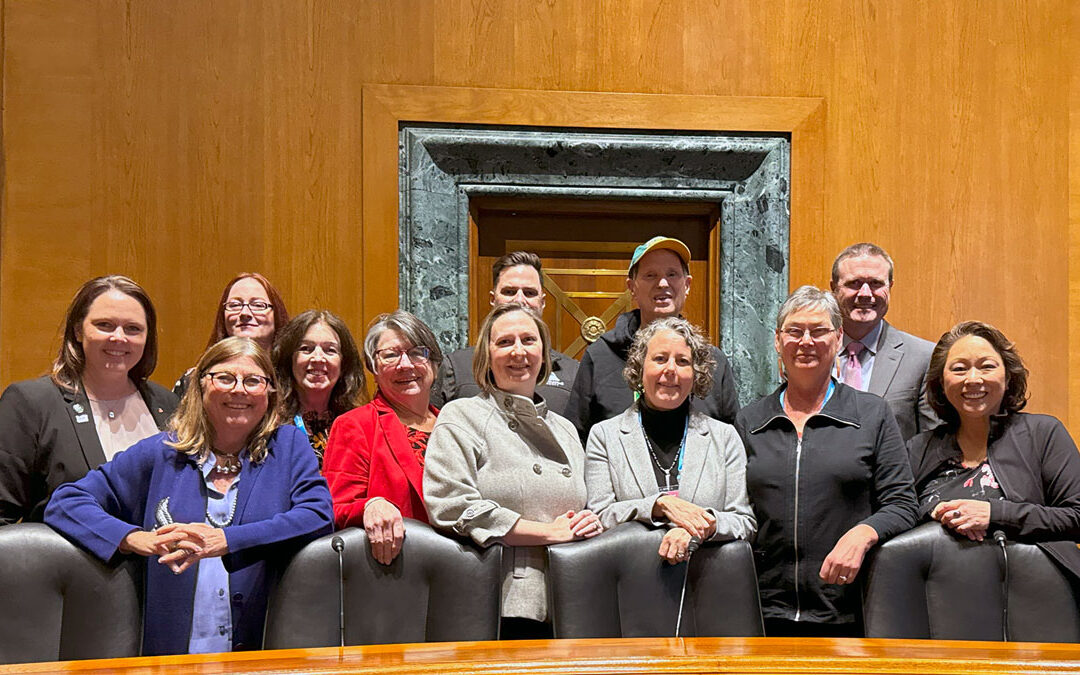
Mar 26, 2024 | AOC Advocacy, AOC News, Transportation
Until the passage of Senate Bill 1566 during the 2024 short session, Oregon law prohibited counties from charging fees for permits issued to water, gas, electric, and communications utilities for construction, repair, or maintenance work in the county right of way.
The statutory preemption on permit fees meant that precious State Highway Fund dollars intended for county road improvements and maintenance were instead subsidizing public and private utility operations. The Association of Oregon Counties (AOC) and the Oregon Association of County Engineers and Surveyors (OACES) have prioritized the lifting of this preemption through legislative action for several legislative sessions.
The concept was introduced as SB 635 in the 2023 session, and AOC participated in a months-long work group with utilities that was ultimately fruitless. Before the end of the 2023 session, AOC successfully advocated for an interim committee work group sanctioned by the Joint Committee on Transportation. That workgroup was led by committee co-chair Sen. Chris Gorsek and committee member Sen. Lynn Findley. Five county representatives participated in several meetings around the state during the interim and negotiated the language that became SB 1566, which was introduced as one of the Joint Committee on Transportation’s three short session bills. AOC and counties are grateful to staff and commissioners from Multnomah, Polk, Union, Jefferson, and Lincoln counties and the leadership and dedication from Sens. Gorsek and Findley, without whom SB 1566 would not have passed.
SB 1566 removes the preemption in ORS 758.010 and allows counties to charge cost-recovery fees for permits issued to the utilities that could previously operate in the county right of way free of charge. The language includes negotiated permit fee exemptions for vegetation management, routine maintenance, and emergencies. Completed fee-eligible permits must be approved or denied by the county within 15 days. SB 1566 sunsets in 2031, so the legislature will have to review and renew the authority it provides to counties in a future session.
SB 1566 is permissive — if a county wishes to pursue the fee structure the bill authorizes, it must pass an ordinance. SB 1566 contains language that allows a county to begin ordinance development immediately, and includes an emergency clause so it will be in effect upon the governor’s signature. AOC and OACES will create opportunities to collaborate on ordinance development and track the efficacy of this new authority over the next five years.
Contributed by: Legislative Affairs Director Mallorie Roberts

Mar 26, 2024 | AOC Advocacy, AOC News, Governance, Revenue, & Economic Development
Following House Bill 3414’s failure during the 2023 session, the prospect of the Association of Oregon Counties (AOC)’s community development policy priority — creating a fast-track process for limited urban growth boundary (UGB) expansions that significantly increase affordable and workforce housing in all communities experiencing shortages of buildable land — looked grim. However, immediately following the 2023 session, Governor Kotek and her policy advisors convened a small group of individuals, including AOC staff, to conduct a series of work sessions. Their aim was to revisit the policy items in HB 3414 and craft a bill to address Oregon’s housing supply crisis that could pass in the 2024 session.
After numerous meetings with the governor’s office, AOC staff and county planning department directors provided input and technical assistance on proposed legislation to ensure cities and counties would be able to implement the legislation if enacted. In consideration of the pending legislative concept, the AOC Transportation and Community Development Steering Committee recommended that AOC readopt our 2023 UGB-related priority as a top priority for the 2024 session.
Senate Bill 1537, the Emergency Housing Stabilization and Production Package introduced by Gov. Kotek, was amended many times before eventually becoming law, with AOC actively involved at every stage of the process.
SB 1537 directly addresses AOC’s fast-tracked UGB expansion priority, establishing a one-time UGB expansion tool for cities that need both land supply and affordable housing. The bill requires 30% of all homes to be built as “affordable housing” and ensures the expansion aligns with the preferences and understanding of Oregonians – with a diverse array of housing choices, a mix of densities and services the residents will need, and the necessary infrastructure for long lasting, successful communities. SB 1537 requires the land to not be zoned high-value farm or forest outside of urban reserves already designated and caps the expansion at a specific number of acres based on population (100 net residential acres for cities with a population over 25,000 and a maximum of 50 net residential acres in cities with a population under 25,000; Metro is capped at 300 total net residential acres).
Cities are currently looking over the requirements that must be met to qualify for this fast-track process. With counties serving as a strong partner in this process, planning departments stand ready to work with our local government partners to begin this process when they are ready.
AOC looks forward to working with the Department of Land Conservation and Development, the governor’s office, and stakeholders throughout the state on the next area needed to address the housing supply issues Oregon continues to face.
Contributed by: Legislative Affairs Manager Branden Pursinger

Mar 1, 2024 | AOC News
AOC kicked off the 35-day 2024 legislative “short” session on Feb. 5, with a full day of internal policy meetings followed by our 2nd Annual Open House. The event proved again to be a great success, bringing legislative and state agency leaders together with county commissioners and judges for networking and relationship building. Feedback from members and partners was enthusiastically positive, and AOC Executive Director Gina Nikkel confirmed that AOC will make the first day of session AOC Open House an annual event.
AOC appreciates members who joined us in advocating for our priority policy items in the Capitol, via virtual testimony, and by responding to calls to action during the fast-paced legislative session. The AOC legislative affairs team saw our staff and members focus on relationship-building and solutions-oriented advocacy pay off in a productive legislative session for counties. Our consistent messaging of state-county partnership is showing signs of progress, with legislative leadership, state agencies, and critical partner stakeholders increasingly looking to AOC for input early in the policymaking process.
“Counties should consider the 2024 session a win both in achieving our policy goals and elevating the county voice in the Capitol. AOC members should continue to show up and engage in our process so we can extend this trend of success and carry proactive statewide policy proposals into the 2025-26 biennium,” said AOC President Danielle Bethell.
Please mark your calendars to attend the March AOC steering committees and Legislative Committee meetings where the legislative affairs team will provide a session recap. Be on the lookout for calendar invitations to ad-hoc meetings of AOC steering committees from April to early June. Deep dives and brainstorms this spring will lead into AOC steering committees and the AOC Legislative Committee convening June 20-21, in person, in Salem to consider and adopt AOC policy priorities for the 2025-26 biennium. AOC looks forward to diving into proactive policy development this spring and bringing statewide solutions to lift all Oregon communities in the 2025 legislative session.
Contributed by: Mallorie Roberts | legislative affairs director

Feb 29, 2024 | AOC News
Over thirty Oregon county officials and representatives of the Association of Oregon Counties (AOC) joined approximately 2,000 attendees from across the country in February at the National Association of Counties (NACo) 2024 Legislative Conference in Washington, D.C.
President Joe Biden headlined the conference, along with cabinet secretaries, leads of federal agencies, representatives from Capitol Hill, private sector partners and senior administration staff. Conference attendees shaped NACo’s legislative agenda, received updates on key federal policies, and advocated for county priorities on Capitol Hill.
President Danielle Bethell commented, “this conference is a great opportunity for commissioners to network, not just with our Oregon peers, but our peers across the nation, and develop intergovernmental partnerships with federal officials on issues important to Oregon counties. This year’s conference offered what felt like more of an opportunity to really dig into important issues to Oregon, together. I really enjoyed the time spent with those who attended and look forward to next year.”
During the conference, the Oregon delegation engaged in NACo policy discussions through NACo’s policy steering committee process, as well as breakout sessions, and general sessions, hearing from a range of speakers in the federal government. Issues covered included disaster preparedness and management, administering the 2024 election, artificial intelligence (AI), housing affordability, behavioral health and justice, and more.
“Federal policies often have direct and long-lasting impacts on county governments and our residents,” said NACo President Mary Jo McGuire. “NACo’s Legislative Conference is an essential opportunity to advocate for county priorities and strengthen intergovernmental partnerships that help our communities move forward together.”
AOC members also met with U.S. Senator Ron Wyden to advocate for AOC policy priorities. Executive Director Gina Nikkel expressed appreciation for Wyden’s partnership and engagement with counties. “I am grateful for Wyden’s openness and availability to connect with AOC membership on a variety of county issues.”
County officials across Oregon found meaning in the program content, as well as the networking opportunities. First Vice President John Shafer encourages commissioners and other county leaders to attend the conference. “So many incredible things happened. From seeing a sitting president to discussing rural issues to visiting the Capitol, the conference offers opportunities to effect change at the federal level that benefits every county.”
For more details about the 2024 NACo Legislative Conference, click here.
Contributed by: Erin Good | communications coordinator

Feb 28, 2024 | AOC News
In a February presentation to a legislative budget subcommittee, the Oregon Liquor and Cannabis Commission (OLCC) revealed that recent liquor sales trends have not kept pace with expectations, and associated revenue projections are being revised downward.
According to the commission, sales of distilled spirits in Oregon grew steadily over the past couple of decades, and then sped up significantly between 2019 and 2021. Experts anticipated those accelerated growth trends would continue through 2023-25. However, as 2023-25 data has become available, the projected growth has not materialized. Rather, growth trends seem to be flattening. OLCC notes that flattening trends in alcohol consumption in Oregon align with national trends.
Slower liquor sales will translate into significantly lower county revenues for 2023-25, the OLCC said. Their prior forecast anticipated counties would receive $64.2 million for the biennium, but their new forecast indicates counties should expect only $51.3 million.
It isn’t known whether flattening sales trends reflect lower alcohol consumption, or whether consumers are just choosing less expensive spirits. However, the fact that alcohol consumption surged during the pandemic was widely reported, so the recent flattening trend could indicate that overall sales trends are returning to normal.
Contributed by: Michael Burdick | legislative affairs manager

Jan 26, 2024 | AOC News
The Oregon Department of Administrative Services (DAS) has begun implementation of an innovative policy to support increased revenue for public lands counties.
Under House Bill 2174 (2021), upon request of a county, DAS is required to credit forest reserve funds that would otherwise be credited to a county road program, to a separate public entity created by the county.
This policy, developed by the Association of Oregon Counties (AOC) in partnership with Representative Mark Owens (R-Crane), provides flexibility for county governments to increase federal dollars from Payment-in-Lieu-of-Taxes (PILT) to support critical needs in rural communities by diverting the 75 percent of U.S. Forest Service (USFS) Secure Rural Schools (SRS) Title I payment to a separate public entity.
Funding credited to a public body under the new law is to be used in the same manner and subject to the same restrictions that would have applied to the funding under the previous distribution model, including, but not limited to, the statutory requirements related to a county road fund.
Counties may now submit requests to DAS by emailing DAS.Distributions@das.oregon.gov with the below information. The deadline for submission to DAS is March 1, and DAS expects disbursements from the federal government in April.
Information Needed:
- W9 – Include the TIN
- LGIP for new agency
- Memo to DAS, asking to add the LGIP account to the vendor profile
- County Ordinance declaring the road agency
- County Intergovernmental Agreement
DAS Staff Contact:
Laura Burnett
971-719-3183
DAS.Distributions@das.oregon.gov
Eligible public entities include:
- An intergovernmental entity created by agreement under ORS 190.003 to 190.130,
- A county road district formed under ORS 371.055 to 371.110, or
- A service district for roads established under ORS Chapter 451.
Jefferson County and Klamath County have passed local ordinances in accordance with HB 2174. These counties have offered to share their county ordinances and intergovernmental agreements (see links below) to serve as a reference for other countries exploring the new law.
Additional resources and information on road district formation are available in the AOC County Road Manual (Chapter 3: Road Revenue, 3.150 County Service District, 3.170 Intergovernmental Transportation Agreements, and Chapter 12: Districting for Road Purpose).
As an important note, SRS payments and PILT payments fall at different times on the calendar, and SRS payments must be allocated to a road district before increases in PILT can be realized. Once a road district is set up, and DAS is notified, they will set up a new vendor profile for the new district, as the payee, changing the payout from the county to the new district. DAS accounting staff will ensure the apportionment among counties of money received from federal government forest reserves is amended in the distribution formula pursuant to ORS 293.560 and ORS 294.060.
Contributed by: Jordan Cole | AOC County Road Program analyst






